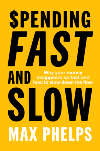Most of us like to think that we’re in control of our money. We think we know what we spend. We think we know how much we can save and believe ourselves to be sane, sensible adults. Effectively, our intuition, or ‘System 1’ thinking, tells us that we’re good enough with money. However this isn’t always the case.
Why is money hard to master?
The truth is that money is hard to master, for three main reasons:
- Temptation is difficult to resist
- Access to money is too easy
- Mental maths is tough
→Related article: How to Write a Budget
1. Temptation
Imagine you eat all your meals at an all-you-can-eat buffet. You know that you need a sensible breakfast, a modest lunch, maybe a snack in the afternoon and a reasonable dinner. However, if a wide variety of tempting food was on display at every mealtime, I’m sure most of us would throw an extra thing on our plate, maybe to try something new, because our eyes are bigger than our bellies or because we feel that it doesn’t really matter.
It’s the same with money. Temptation is everywhere, and advertisers and marketers are paid big dollars (and spend millions) to grab our attention and make us think that we want things – and in unexpected ways. One of the most bizarre statistics that I found in my research for my book is that if a shop plays slow music, people spend 38% more in that shop than if they played no music at all! Additionally, if the songs are familiar, we may spend less, while we spend more if they’re unfamiliar. Almost everyone thinks they’re in complete control of their actions, that they’re not a person who buys something they weren’t planning to, but these studies show that’s just not true.
Online it is even more tempting to spend money. There are systems and tricks everywhere these days, with cross-site tracking, social media marketing and algorithms that link everything together to cleverly target you with ads for just what you might want. Think about when you’ve been consuming content or looking up something and suddenly you see ads for that same thing in your social media feeds.
2. Access
We have access to our money via our cards, phones and watches all the time. An interesting psychological trait that we all have when it comes to any type of resource is the fear of scarcity. When a resource is scarce, we treat every use of that resource as difficult and painful, and we use that resource very carefully. When a resource appears abundant, then we know we’re fine to use it for whatever we want, whenever we want.
It’s easy to think of this in the context of fresh water or food. If those things are abundant, then we can eat and drink what we want. We can flush away and wash ourselves with fresh, clean water and not feel guilty about it. When we have droughts, we’re asked to stop watering our gardens and washing our cars, spend less time in the shower and flush sparingly.
A study in the Journal of Consumer Research shows it’s the same with money. When people are prompted to think about smaller amounts of money, such as how much is in their wallet or their everyday account, they spend significantly less than when they think about their total net worth or life savings.
There are a few psychological processes that are relevant to the funds we can access, which collectively can be called ‘mental accounting’ – a term I’ve drawn from the title of Richard H Thaler’s article on the subject. Here are three key effects, also drawn from Thaler’s article, that I’ve noticed when working with clients to help them achieve their goals:
The framing effect
This describes how we see $10 from a budget of $50 as significant and $10 from a $200 budget as trivial. This can result in many small expenses being regarded as trivial relative to the budgeting cycle, which in my experience is normally linked to a pay cycle. Comparing expenses to a large figure such as a monthly pay cycle is more likely to make them seem trivial, meaning more might be wasted on clothes or Uber Eats.
The wealth effect
The wealth effect describes how we tend to spend more when we think about or have access to our whole life savings. This is problematic when we do all our banking with one bank and can access all our savings instantly. Another study shows a paradox with a growing trend of moving to daily pay increasing feelings of wealth and therefore spending, despite average daily balances being potentially lower. This is consistent with my observations of people who are paid weekly tending to be more wasteful on smaller items, such as bought lunches and soft drinks, than people paid monthly.
The source of funds effect
This describes how we view money from a bonus or a windfall differently from regular income. People are far more likely to gamble or spend a windfall gain on discretionary items than their regular income.
For most of us, the question is not about having access to $50 of pocket money, because we typically give ourselves access to our entire pay through our debit cards and then access to hundreds (or even thousands) more dollars with our credit cards. This means we’re likely to feel we have no reason to be careful with money and that each individual decision to spend won’t make much of a difference.
→Related article: How to Save $5000 in Three Months
3. Mental maths
When we do all our banking with one bank and have access to all our pay in one bank account, it’s very difficult to keep track of what we’re spending. Try this simple exercise. Get out a pen and paper or a blank document or your notes app and answer the following questions:
- Last weekend, what places did you go to?
- How much did you spend at each place?
- How much did you spend in total?
Most people only have a very rough idea about how much they spent. Even those with a great memory struggle to get an accurate figure because they forget the extra little things, such as giving $5 to charity or buying a drink on the way back from the shops.
You might think your banking app keeps track of that for you, but even then the only way to figure out last weekend’s spending is to look at the balance on Friday afternoon and the balance on the following Monday morning and then calculate the difference. Most apps don’t tell you what bills or special events are coming up, either, so how do you know whether the amount you spent on the weekend is in line with your budget for the month, the quarter or the year?
Even if you do a full analysis of your spending and resolve to take sandwiches to work to cut back on historically high lunch costs, it’s like plugging a hole in a colander: the water will just disappear through another hole. Unless you’re looking at the app every single day, you won’t know how much things cost.
It all sounds way too hard, and we don’t like to do hard stuff, so most of us adopt shortcuts. This is classic System 1 thinking: Let’s find an easy solution that doesn’t require a lot of thinking, rather than spending time analysing the problem. We use these sorts of shortcuts:
- The credit card bill should be around $3000 to $4000 a month. More than that and I need to worry or stop spending
- I should have at least $1000 left in my bank account at the end of the month
- I save $1500 as soon as I get paid at the start of the month, then I try to save any leftover
Compare Credit Cards with Canstar
People who have a natural tendency to save will probably have an allocation going into their savings account each pay cycle, so they know (or at least they think) that what’s left in their account should be OK to spend. The difficulty here is that bills aren’t synchronised to pay cycles. They come monthly, quarterly and yearly, regardless of whether we’re paid weekly, fortnightly or monthly. When I ask people why they dip into their savings, they always say that it’s to pay for bigger bills (such as medical bills, car registration and insurance), holidays or gifts.
It’s very hard to keep track of whether we’ve just used up all the money we allocated to spend, or if we needed to keep a certain amount of money back to cover a big bill. If you’ve a pay cycle with no bills whatsoever, you might still need to dip into savings when all the bills are due the next month. System 1 thinking tells you this is because all of the bills are due at the same time, but the real issue is that you spent too much in the first pay cycle.
Going back to the all-you-can-eat buffet, it’s all very well to say that we’re going to concentrate really hard and be really careful at each and every meal, but how long will that last? Eventually our commitment waivers; something else happens in life that makes us feel a bit bad – or even amazing and like we should treat ourselves. If we’re still going to the buffet every day, we know that over the long term we’re going to overeat. The only solution is to change where we go to eat and how we access food. The same is true with money.
→Related article: How Much of My Income Should Go Towards Rent?
Getting real
When we combine temptation everywhere, almost unlimited access to our money and an inability to keep track of it all in our heads, it’s no wonder that most of us aren’t very good with money. Even if you think you’re doing OK, almost everyone is worse with money than they think they are. Once we accept this fact about ourselves and understand that we can’t really change because we’re human, then we can find real solutions to the problems of managing money.

This is an edited extract from Spending, Fast and Slow: Why money disappears so fast and how to slow down the flow (Major Street Publishing AU$29.99), republished with permission.
About the reviewer of this page
This report was reviewed by Canstar Content Producer, Caitlin Bingham. Caitlin is an experienced writer whose passion for creativity led her to study communication and journalism. She began her career freelancing as a content writer, before joining the Canstar team.
Enjoy reading this article?
You can like us on Facebook and get social, or sign up to receive more news like this straight to your inbox.
By subscribing you agree to the Canstar Privacy Policy





Share this article